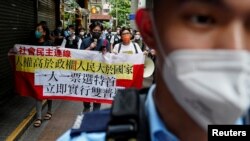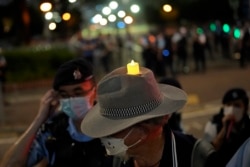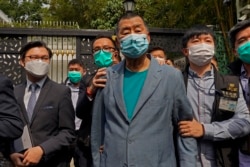On July 12, Hong Kong officials met with experts from the United Nations Human Rights Committee to determine how the special administrative region has implemented provisions of the International Covenant on Civil and Political Rights.
Several committee experts expressed concern over rights restrictions under Hong Kong’s National Security Law (NSL), which was passed on June 30, 2020, in response to the 2019–2020 Hong Kong pro-democracy protests.
The Hong Kong delegation sidestepped issues regarding the shrinking space for political and civil participation, claiming that “human rights shall be respected and protected” under the NSL.
Secretary for Constitutional and Mainland Affairs Erick Tsang argued that the overhaul of Hong Kong’s electoral system with the NSL had made Hong Kong more democratic than ever.
“In fact, democracy has taken a quantum leap forward since the return to the motherland in 1997,” Tsang said.
“The most recent development is the improvement of the electoral system. The new system has enhanced its democratic elements and quality.”
That is false.
As Polygraph.info previously reported, mechanisms like Hong Kong’s NSL and electoral reform law are not found in democratic countries.
China’s top legislative body introduced the electoral reform law in March 2021. A largely opposition-free Hong Kong legislature adopted it in May 2021.
The law created a candidate-qualification review committee, which determines who can run for the Election Committee, the Legislative Council and the Chief Executive positions.
That system is meant to ensure that Hong Kong is run by “patriots.”
Hong Kong’s administrators argues that “keeping political power in the hands of patriots is a political rule commonly practiced in the world.”
But unlike in democracies, it is the Chinese Communist Party (CCP), not the electorate, which decides on a candidate’s patriotic bona fides. Senior Chinese officials have admitted their definition of patriotism entails love for China’s current political system, rather than for the country.
Tsang argues that the expansion of the Election Committee (EC), a Hong Kong electoral college that selects the special administrative region’s chief executive and lawmakers, and the Legislative Council (LegCo), has helped make them “more representative of Hong Kong society” and allowed “broader public participation in political processes.”
He noted the EC had been expanded from 1,200 to 1,500 members, while the the LegCo grew from 70 seats to 90 seats.
But analysis from the Hong Kong Free Press found that only a quarter of candidates were poised to take part in a contested race during the September 2021 Election Committee election.
And while the size of the LegCo was expanded, the number of directly elected seats was slashed from 35 to 20. What’s more, under the amended election system, the EC is responsible for selecting 40 legislative seats. The remaining 30 seats are determined by functional constituencies, representing “sectors which are substantial and important to the development of the community.”
Critics have long said functional constituency elections give business and professional groups an outsized role in determining the composition of Hong Kong’s legislature.
A democratic system is also more than just elections.
Civil liberties, which Britannica defines as “freedom from arbitrary interference in one’s pursuits by individuals or by government,” are “protected explicitly in the constitutions of most democratic countries.”
Hong Kong’s National Security Law (NSL) has gone a long way in eroding those freedoms, undermining the city-state’s de facto constitution (Basic Law).
As Polygraph.info previously reported, the NSL criminalizes four categories of activities – secession, subversion of state power, terrorism and collusion with foreign entities. The law also gives authorities in Hong Kong and Beijing wide latitude to control the internet, media outlets, schools and other groups. China also claims the NSL has authority over anyone anywhere in the world.
The British-based rights group Amnesty International called the NSL “dangerously vague and broad,” warning “virtually anything could be deemed a threat to ‘national security’ under its provisions.”
Amnesty shuttered its Hong Kong office in October 2021, saying the NSL made it “effectively impossible” to work “freely and without fear of serious reprisals from the government.”
New York-based Human Rights Watch, which also left Hong Kong, said Beijing had broken its promise “to respect the city’s freedoms – a guarantee enshrined in the territory’s functional constitution – and rights protected in the Basic Law.”
In late June, the Hong Kong Free Press reported at least 58 organizations, “including unions, churches, media groups, and political parties,” had disbanded since the NSL came into force.
Reporters Without Borders noted that Hong Kong’s free press, “once one of the most outstanding in Asia, is more threatened than ever.”
“The Hong Kong government has engaged in an unprecedented campaign against independent journalism in total disregard for the territory’s Basic Law, which enshrines the principle of press freedom,” wrote Reporters Without Borders (RSF) East Asia Bureau head, Cedric Alviani.
That crackdown on journalism included the forcible closure of two independent media outlets, Apple Daily and Stand News.
The public broadcaster Radio Television Hong Kong (RTHK) also paired up with Chinese state media to help “nurture patriotism.”
Hong Kong dropped to 148th place on the 2022 RSF World Press Freedom Index, down from 80th place in 2021.
The founder of Apple Daily, Jimmy Lai, was the first high-profile arrest under the NSL. Lai was sentenced to 13 months in jail for “incitement to knowingly take part in an unauthorized assembly” during Hong Kong’s June 2020 Tiananmen Square candlelight vigil.
The annual event commemorates the 1989 Tiananmen massacre in Beijing.
ChinaFile, an online magazine published by the Center on U.S.-China Relations at Asia Society, says 203 people had been arrested and 123 charged under the NSL as of June 26.
In May, 90-year-old retired bishop Cardinal Joseph Zen, along with four other pro-democracy figures, were arrested on NSL-related offenses, sparking an international outcry.
Earlier this month, the outgoing top U.S. diplomat in Hong Kong warned the "crude and chilling” use of the NSL was threatening Hong Kong’s status as a global financial hub.


